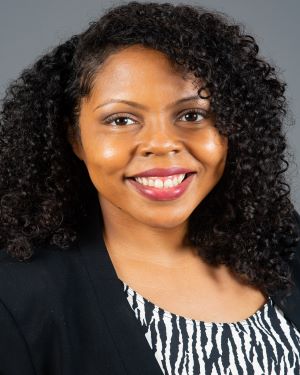Caralee Jones-Obeng

Associate Professor of Africology and African American Studies
Africology and African American Studies
614K Pray Harrold
Education
Ph.D., African American and African Diaspora Studies (minor in Sociology), Indiana University
M.A., African American and African Diaspora Studies, Indiana University
B.A., Sociology and Anthropology, DePauw University
Dissertation
“Interpersonal Relationships Among Different Black Ethnic Groups: An Exploratory Study of African, African American and West Indian Students."Interests and Expertise
Dr. Jones-Obeng’s scholarly interests include race, ethnicity, immigration, identity and the African diaspora. She is currently in the process of transforming her dissertation into a scholarly manuscript. Her dissertation research explored Black ethnic diversity in Houston, Texas. Drawing from ethnographic and in-depth interviews with 20 Jamaicans, 27 Nigerians and 20 African Americans in Houston, Texas, Jones-Obeng examined interpersonal relationships among her diverse participants. She investigated how her respondents racially and ethnically identified, their experiences with racism and discrimination, and their feelings of closeness and linked fate with each other. She also examined cross-cultural perceptions, interactions, friendships, and the development of romantic relationships.
Jones-Obeng’s research yielded three significant findings. First, she found that the majority of Jamaican, Nigerian, and African American participants racially identified as either Black or African American. They also had similar encounters with racial discrimination. Thus, racial identification and racial discrimination helped forge a shared consciousness of being Black. Next, in terms of interpersonal relationships, she discovered that most of her respondents interacted and befriended individuals from another Black ethnic group. However, when it came to romantic relationships, her participants were less likely to cross-culturally date or marry. Finally, varying perceptions of work ethic and access to opportunities in the US were listed as reasons for Black inter-ethnic disunity, while experiences with racism and a shared appreciation for music, dance, and cultural festivals were factors that helped unite Jamaicans, Nigerians, and African Americans.
Publications and Presentations
PEER-REVIEWED JOURNAL PUBLICATIONS
Obeng-Jones, Caralee. 2021. “Does Racism Discriminate? Racial and Ethnic Discrimination Among Nigerians and Jamaicans in Houston Texas.” Journal of Black Studies 52(8): 844-911.
Jones, Caralee and Christy Erving. 2015. “Structural Constraints and Lived Realities: Negotiating Racial and Ethnic Identities for African-Caribbeans in the US.” Journal of Black Studies 46(5): 521-546.
SELECTED PRESENTATIONS
“Homogenous Complexity: Exploring the Racial and Ethnic Identities of African Americans, Nigerians, and Jamaicans in Houston, Texas” Paper presented at the National Council of Black Studies in Atlanta, Georgia (March 2020)
“Blurred Blackness: The Experiences of Black Bi-ethnics in Houston, Texas.” Paper presented at the National Council of Black Studies in Atlanta, Georgia (March 2018)
“Racial Unity and Ethnic Conflict: The Politics of Identity for Nigerians, Jamaicans, and African Americans in Houston, Texas.” Paper presented at the National Council of Black Studies in Houston, Texas (March 2017).
“An African Diasporic Approach to Studying Black Immigrants in the United States.”
Paper presented at the National Council of Black Studies in Charlotte, North Carolina (March 2016).
“Same Food, Different Flavors: Interpersonal Relationships among African Americans,
Nigerians and Jamaicans in Houston, Texas.” Paper presented at the Association of
Black Sociologist, the Association for the Study of the Worldwide African Diaspora in Charleston, South Carolina and the Society for the Study of Social Problems in Chicago, Illinois (August 2017, November 2015, and August 2015).
